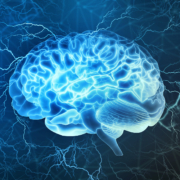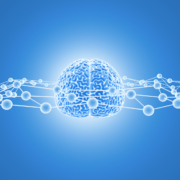Understanding the ins and outs of epilepsy
Dr. Bruce Hermann, emeritus professor of neuropsychology at the University of Wisconsin School of Medicine and Public Health, has studied epilepsy in adults and children for nearly four decades. In that time, he has conducted research on the progression of neuropsychological, psychiatric, and quantitative MRI abnormalities in patients with chronic epilepsies; the status of cognition, psychiatric status, and brain structure in new onset pediatric epilepsies; and the brain and cognitive aging in elders with chronic epilepsy. BrainWise Managing Editor Matt Villano recently sat down with Dr. Hermann to discuss epilepsy and the potential impact of epilepsy on cognition. What follows is an edited transcript of their interview.
BrainWise: What is epilepsy?
Dr. Bruce Hermann: As defined by the International League Against Epilepsy (ILAE), epilepsy is a “family” of disorders, a heterogeneous condition characterized by multiple possible seizure types and syndromes and diverse etiologies. Some 50 million people worldwide have epilepsy and it is a ‘lifespan disorder.’ In fact, the two highest incidence peaks occur in childhood and then older age. There is a diversity of epilepsy syndromes—over 20 recognized by the ILAE—that range from severe and devastating to well controlled and self-limited. It’s hard to talk about epilepsy in general terms because it’s such a diverse disorder, but at its core epilepsy is characterized by underlying neuronal hyperexcitability and predisposition to recurrent seizures with classification is driven in large part by electroencephalographic signatures and clinical presentations.
An important aspect of epilepsy is its international impact. The majority of epilepsy occurs in lower-middle and lower-income regions of the world, where a large majority of patients unfortunately go untreated. This is a huge global problem that has been and currently continues to be addressed by organizations such as the World Health Organization.
BrainWise: How can epilepsy affect cognition?
Dr. Hermann: A long-standing guiding principle has been the “lesion model,” suggesting that the risk of specific cognitive abnormalities is associated with specific epilepsy syndromes. If one has temporal lobe epilepsy, a disorder predominantly of the medial and lateral temporal lobe(s), you would expect the main consequence to be memory compromise. For frontal lobe epilepsy, the expectation is that the patient would be most likely to exhibit difficulties in aspects of executive function. Those epilepsies that begin in parietal-occipital areas would be expected to be associated with perceptual and construction abilities. This model has followed the classic structure/function line of thinking, and has driven substantial clinical work and research in the field in both child and adult epilepsies. There has also been decades-long interest regarding how factors such as seizure control, medications, age of onset, duration of epilepsy, and other clinical seizure features may affect cognition.
In my view, we also need to think beyond just clinical seizure variables. We must ask, for example, what is the impact of the level of disadvantage in the family and their neighborhood on cognition, behavior, and academics? What are the important resilience factors that patients may present with and serve to protect their cognition? What are the genetic risk and resilience factors present, and other factors that are underexplored? I think this line of thinking will drive the future once the syndrome-specific cognitive phenotypes are fully identified.
BrainWise: To what extent is it possible to have a seizure and not even know you’re having a seizure?
Dr. Hermann: Some patients may be unaware of their seizures, or at least some seizures. This can be due to at least two factors: what we call ‘true unawareness’ and unrecognized epilepsy. I have seen patients with (typically) right temporal lobe epilepsy in the monitoring unit and while they were undergoing cognitive assessment, they have had a complex partial seizure, after which they appear completely unaware of the event. This dense non-awareness (not psychological denial) of the event is not common but is very interesting both clinically and theoretically. Beyond that, it’s possible to have electrographic seizures without a major clinical manifestation, essentially an electrical storm in the depths that just doesn’t become manifest clinically or even on surface EEG electrodes. These issues are some of the reasons why seizure diaries can be problematic in terms of deriving an accurate count of seizures. That said, few fail to not know they had a generalized seizure [and that includes stiffening and jerking of the muscles, known as a “tonic-clonic” seizure].
BrainWise: Can people with epilepsy really have episodes triggered by strobe lights?
Dr. Hermann: Yes, there are so-called reflex epilepsies. It’s a class of seizures triggered by certain stimuli or patient-specific behaviors. Prominent and perhaps most common among the reflex epilepsies is photosensitive epilepsy, which is a sensitivity to certain light frequencies, sunlight glittering on water, and more. The risk of photosensitivity can be examined during the EEG.
BrainWise: What are some of the main challenges a person with epilepsy faces in everyday life?
Dr. Hermann: The challenges can be many. To give one example, this is a disorder associated with warning-less and often poorly predictable episodes of loss of control. Patients might have an aura with a bit of a warning, or they might have some vague feeling of unwellness that precedes a seizure, but otherwise seizures can strike virtually anytime and anywhere. Many patients (and parents of children with epilepsy) express concern about this episodic vulnerability. Is it safe to go out? What happens if I have a seizure on the street? If I have a typical uncomplicated seizure on the street will someone call an ambulance and take me to the ER followed by a bill for thousands of dollars? One can only imagine the concerns of parents as they send their child off to school and other activities. Patients and parents struggle with issues of disclosure, stigma, and other complications. So in addition to the underlying neurobiology of epilepsy and its clinical presentations, there is a very complex human and psychosocial side to dealing with epilepsy and its unpredictability.
I’m not totally up to speed on this, but currently there is much interest in so-called wearable devices to both record and, in the best outcome, to ultimately predict the risk of a seizure. Accurate recording of seizures is critical for optimal medication management. Of course the ability to predict high versus low risk of a seizure on a given day would be a major advantage for patients and families.
Another core concern for patients and parents is the possibility of progressive cognitive and behavioral consequences that might accrue with chronic epilepsy. International research has shown that patients with new-onset epilepsies, even uncomplicated epilepsies, may exhibit a higher rate of cognitive, academic, and behavioral issues, not only early in the course of epilepsy but even before seizure onset and treatment—in a sense flipping the progression issue on its head. Something may be happening antecedent to epilepsy, neurodevelopmental issues in the case of children, contributing to cognitive and other issues that are later detected after diagnosis. So, the untangling of the timing of the comorbidities is really quite interesting, and the general conception of epilepsy has been changed to include these inherent cognitive behavioral difficulties. The clinical implication for neuropsychology is to identify these comorbidities early in the course of the disorder and act and intervene accordingly.
BrainWise: How do doctors treat epilepsy, and how has that treatment evolved?
Dr. Hermann: In broad strokes of course, antiseizure medications (ASMs) are the first line of treatment. Over the decades a greater number and diversity of medications with fewer adverse side effects have become available. For those who continue to have seizures, surgery, of course, is an option. Historically, primarily resective surgery was the only option—temporal lobectomy or lesionectomy. Today, in addition to resective surgeries, there are now a number of neurostimulation procedures and alternative surgical approaches (as well as dietary therapies) which offer patients with drug resistant epilepsies greater options for intervention.
BrainWise: Is there a cure for epilepsy, or at least a way to get it predictably under control?
Dr. Hermann: Approximately 70 percent of patients benefit from well-controlled epilepsy with antiseizure medications. We tend to focus on those who don’t have good control because they are the ones who come to tertiary medical centers. Here at the University of Wisconsin we’ve had the opportunity through research protocols to see patients who have had well-controlled seizures for some time. They come in annually for med checks and appear to be managing well and appear quite stable over time.
BrainWise: What are the most important things you’ve learned about epilepsy from your research to date?
Dr. Hermann: I think heterogeneity in the cognitive and behavioral presentations of patients within any epilepsy syndrome is a huge issue. The other is that neurobehavioral comorbidities can be present in new onset cases. When diagnosed with epilepsy, cognition and behavior are less affected but become more compromised and complicated over time. In our work with new and recent onset pediatric idiopathic epilepsies, cognitive and behavioral problems can be detected at the onset of the disorder and then their prospective course is characterized by stability—they ‘stay the course’ over three to five years and don’t get ‘worse.’ To this I should add there are some epilepsies that do get worse, too.
What has really captured interest these days is the overlap, or the bidirectional relationships that may exist between Alzheimer’s disease (AD)/dementia and epilepsy. It has become apparent that among individuals who have early-onset Alzheimer’s disease, and to a lesser extent mild cognitive impairment (MCI), epileptogenic spikes and sometimes subtle seizures can be detected in a subset of patients. This has been demonstrated in animal work and is being examined intensely in humans. A subset of patients with late onset epilepsy of unknown etiology may go on to develop AD and related disorders . The other longstanding issue of concern has been the cognitive and behavioral course with aging—if you’ve had epilepsy your entire life, what happens as you get into your 60s, 70s, and 80s? The relationship between dementia/Alzheimer’s disease and epilepsy was arguably unanticipated and appears quite important.
BrainWise: Where is the most exciting research into epilepsy happening today?
Dr. Hermann: In pediatrics there have been significant efforts to increase consideration of surgical intervention for medication-resistant epilepsies earlier rather than later. There has been considerable international work looking at the impact of the timing of epilepsy surgery on subsequent cognitive function and development. Also exciting are the many efforts of the Centers for Disease Control and Prevention (CDC) to develop programs that offer to impact the quality of life of people with epilepsy. The programs include but are not limited to their Living Well with Epilepsy Network; a program called HOBSCOTCH, which is a patient empowered way to improve cognition; and Project UPLIFT, which is designed to try to prevent and treat depression in people with epilepsy.
This article has been factchecked. For more about that process, click here.









